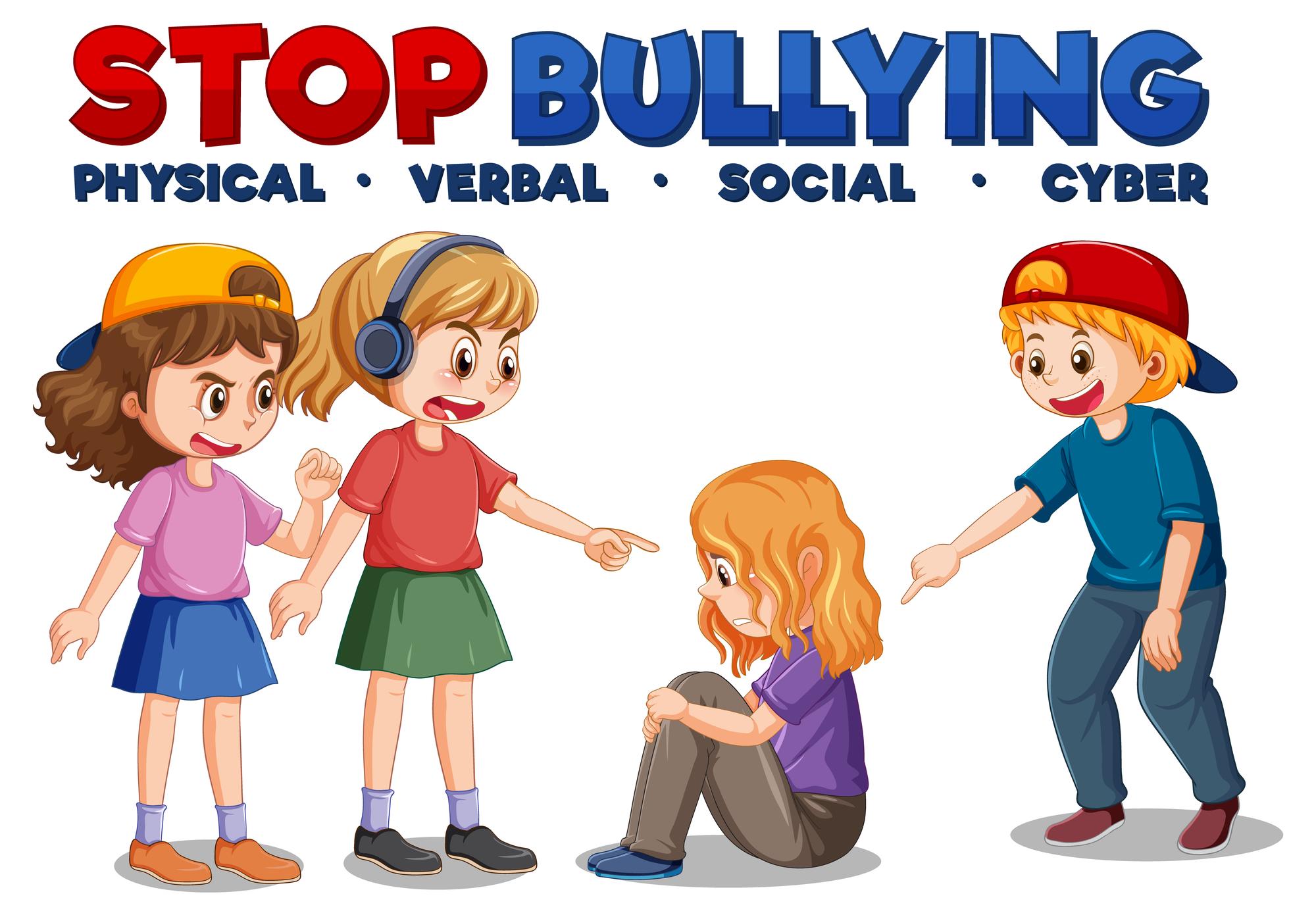Sticks and Stones: Bullying Clarified and the Christian's Response
For good reason, much is being written and talked about regarding bullying. Whether bullying occurs in the school setting, the home, or the 'streets,' we can agree that the problem needs to be recognized and confronted.

"Sticks and Stones may break my bones, but words will never hurt me" is a children's rhyme intended to help kids respond to name-calling and bullying. This phrase was first published in 1862 in The Christian Recorder, a publication of the African Methodist Episcopal Church. More recent rhyming phrases have been shared with children that portray the same purpose: "I'm rubber, and you are glue; what you say bounces off of me and sticks to you!" or "Is it true? Then it says everything about them and nothing about you." Regardless of the phraseology, words do hurt. The scars left by words never heal.
For good reason, much is being written and talked about regarding bullying. Whether bullying occurs in the school setting, the home, or the 'streets,' we can agree that the problem needs to be recognized and confronted. From a Christian perspective, we are all sinners prone to self-centeredness, abusiveness, and distortion of proper social behavior. We must realize these assumptions to identify bullying tendencies and behavior in ourselves and others more honestly.
The topic of bullying is commonplace in our culture and portrayed in the media. Here are a few examples that are familiar to most of us:
Rudolph the Red-nosed Reindeer
He had a very shiny nose. If you ever saw it, you would even say it glowed. All of the other reindeer used to laugh and call him names. They never let poor Rudolph play in any reindeer games.
Charlie Brown, the blockhead.
Lucy is Charlie Brown's chief tormentor. She acts like his friend on many occasions, and they talk often. Lucy acts like a bully towards Charlie Brown, making insensitive remarks about how much he is a failure and calling him names, especially blockhead. In both the fall and Christmas specials, specific scenes are bullying. In the fall episode, Lucy tricks Charlie Brown into kicking the football and pulling it away at the last minute, causing Charlie Brown to tumble. In the Christmas special, Charlie Brown is tasked to pick out the Christmas tree for the school play. The pitiful tree he and Linus pick is ridiculed and laughed at to scorn through the group's disappointment in Charlie Brown's compassion for the sad little tree.
Calvin deals with Moe and Susie.
In Bill Waterson's comic strip Calvin and Hobbs, Calvin must deal with a bully named Moe. He is described as monosyllabic and crude. Waterson says of Moe he is "every jerk I've ever known." In addition to Moe, Susie Derkins is a bully to Calvin. She is a classmate who often uses her intelligence and social standing to outmaneuver Calvin in arguments or situations.
Barney Fife is Mayberry's bumbling deputy.
On The Andy Griffith Show, Deputy Barney Fife is often portrayed as an inept, self-appointed example of strict law enforcement in Mayberry, NC. Most of the show's plots put Barney in a precarious situation, showing his foolishness and weaknesses. One episode pits Barney against a tough guy who breaks the law by sweeping trash on the sidewalk. Frail Barney must face this bully, who threatens to harm him when he catches him off duty. Andy usually must figure out a unique way to save Barney from physical harm.
Opie faces the bully.
In another episode, "Opie and the Bully," Andy's son Opie is harassed and intimidated by a new boy who steals things and gets in trouble. This bully takes Opie's snack money daily on his way to school. Heeding his Dad's advice, Opie stands up to the bully. It gives Opie a black eye, but it stops the bullying.
What is bullying?
Bullying is a phrase we hear regularly and often in the media, on TV shows and movies, in schools, and in conversations among both adults and children. Parents, students, and schools are rightfully worried about bullying. It is a problem and cause for concern but may not be as widespread as many think because the term "bullying" is often used as an umbrella to describe all kinds of mean behavior—from a rude comment to a conflict between two people to a one-time physical altercation. While teachers and administrators want to be sure they're helping identify and end actual bullying, they worry that incorrect use and overuse of the word will cause it to lose meaning, and real bullies will slip through the cracks.
A simple definition of bullying is intentional, repetitive, unwanted, aggressive behavior that involves a real or perceived power imbalance to harm, intimidate, or coerce others who are perceived as vulnerable. Bullying can be physical, verbal, or psychological.
The key point is that bullying is targeted, intentional, and repetitive; it is a pattern of behaviors that harms a child.
There are four key elements in the definition of bullying:
- Intent (the premeditated desire to harm, hurt, embarrass, ridicule)
- Repetition (more than once or have the potential to happen more than once)
- Power imbalance refers to someone exerting superiority over another. This can be due to physical strength, popularity, or access to embarrassing information. When one person has this kind of advantage over another, it can lead to bullying behavior.
- Hurtful (physical, emotional, or psychological)

There are four types of bullying:
- Verbal bullying is saying or writing mean things about someone else. (repetitive teasing, name-calling, inappropriate sexual comments, taunting, threatening to cause harm)
- Social bullying or relational bullying involves hurting someone's reputation or relationship. (repetitively leaving someone out on purpose, telling others not to be friends with someone, spreading rumors, embarrassing others in public)
- Physical bullying involves hurting a person's body or possessions (repetitive hitting, kicking, pinching, spitting, tripping, pushing, taking or breaking someone's things, rude/crude inappropriate hand gestures)
- Cyberbullying: use of the internet (social media, primarily) to target their victims. Rumors and insults can quickly spread through social media, and it's nearly impossible to eradicate them.
Warning Signs for Bullying:
Recognizing the warning signs of bullying is a crucial first step in addressing this issue. While not all children show signs of bullying or bullying others, being aware of these signs equips us to act against bullying, creating a safer environment for all.
Signs of being bullied: (look for changes)
- Unexplainable injuries
- Lost or damaged clothing, books, electronics, or jewelry
- Frequent headaches, stomach aches, feeling sick, or faking illness
- Changes in eating habits (skipping meals, binge eating, unusually hungry after school)
- Difficulty in sleeping at night
- Declining grades, loss of interest in schoolwork, not wanting to go to school
- Sudden loss of friends or avoidance of social situations
- Decreased self-esteem, helplessness
- Self-destructive behavior (running away, self-harm, suicidal talk, unusual searches on the web)
- Distress or involved in dangerous situations
Signs of Bullying Others: (they may)
- Get into physical or verbal fights
- Have friends who bully others (research has documented that bullying is usually a group activity)
- Increasingly aggressive
- Have unexplained or extra money or things
- Blame others for their problems
- Do not accept responsibility for their actions
- Being overly competitive and paranoid about their reputation or popularity.
There are various reasons why some people bully others.
As mentioned earlier, most bullying stems from group activity through peer pressure. The desire to be accepted, overly concerned about popularity, and the desire to maintain social status or allegiance are potent driving forces to exhibit power or dominance over someone different or vulnerable.
For others, bullying starts at home. Homes that are aggressive and violent, where there is little to no emotional support or communication, tend to breed bullying behavior as a way of life. Those homes typically respond to any authority figure in a negatively reactive way. Homes where parents are overly lenient or uninvolved in their children's lives will tend to create children who learn to intimidate those who are perceived to be weaklings.
Another pertinent reason for bullying comes from emotional factors. Bullies may have been bullied in the past. Due to insecurity and low self-esteem, they bully others to make themselves feel more powerful. Students who may be depressed or paranoid are easily pressured by peers to hurt or harm others intentionally.
Research has determined that students who exhibit aggressive behavior, are easily frustrated, have issues at home, have difficulty following rules, view violence in a positive way, or have friends who bully others are prime candidates to be involved in bullying.
What bullying is NOT:
1) Excluding someone—It is not considered bullying if children exclude someone on the playground occasionally or do not invite someone to a party. Repeated and deliberate exclusion, however, can be bullying.
2) Disliking someone – Children may verbally or nonverbally communicate their dislike of another child. Not liking someone is okay if they don't start rumors or verbally abuse another person.
3) Accidental physical harm—A child might unintentionally bump into or trip another child. This is not bullying if it is not deliberate (intent).
4) Being "bossy"—It is natural to want friends to play a certain way; some children take the director role. Learning to lead skillfully is a lifelong process.
5) Arguments – We all argue, and arguments will inevitably happen.
The Christian Response to Bullying
It is no secret that bullying is a challenge that we face on a national level. As Christians, we know that our hearts are far from God, and we struggle with anger, hurt, and hate. How can we teach our children to have courage and love like Jesus when he stood up to the crowd and defended the defenseless?
Although the Bible does not explicitly address bullies or bullying, many biblical principles apply. Bullying is not godly. Christians are called to love others, look out for the weaker, and not intimidate or manipulate people (James 1:27; 1 John 3:17–18; Galatians 6:9–10). Given that Christians should not be bullies, how should they respond to bullying?
Christians who seek to motivate themselves and others to prevent and stop bullying behavior should be reminded that God's very character and, therefore, His expectation for His people is to "do justice, to love mercy, and to walk humbly with your God." Micah 6:8.
There is no room in the Christian faith for belittling or abusing someone. Every person, regardless of what they look or act like, is created in the image of God (see Gen. 1:26-27; James 3:9-10) and is worthy of the dignity God gives to every person. Bullying, therefore, is never okay.
Generally, there are two situations in which a Christian may need to respond to bullying: when he is the victim of bullying and when he witnesses it.
- When bullied, the proper response might be turning the other cheek or self-defense.
When Jesus spoke of "turning the other cheek" in Matthew 5:38–42, He taught us to refrain from retaliating to personal slights. The idea is not to return an insult with an insult. When someone verbally abuses us, we do not return his affront with insults of our own. When someone tries to assert his position of power to intimidate us or force us into a specific behavior, we can resist his manipulation without being manipulative in return. In short, bullying a bully is not biblical and, quite frankly, not practical.
Let us consider what God's Word teaches about the proper response to bullying:
First, God teaches us not to respond angrily with harsh words or fighting. Instead, we should react in gentleness and love, taking comfort in Jesus' words that we are blessed when persecuted.
- A soft answer turns away wrath, but a harsh word stirs up anger.. – Proverbs 15:1
- Blessed are the merciful, for they shall receive mercy. Blessed are the pure in heart, for they shall see God. Blessed are the peacemakers, for they shall be called sons of God. Blessed are those who are persecuted for righteousness sake, for theirs is the kingdom of heaven. Blessed are you when others revile you and persecute you and utter all kinds of evil against you falsely on my account. Rejoice and be glad, for your reward is great in heaven, for so they persecuted the prophets who were before you. – Matthew 5:7-12
Second, God tells us to forgive just as Jesus forgave us, not just once but "seventy-seven times," which means we must forgive anytime we have been wronged.
- Put on then, as God's chosen ones, holy and beloved, compassionate hearts, kindness, humility, meekness, and patience, bearing with one another and, if one has a complaint against another, forgiving each other; as the Lord has forgiven you, so you also must forgive. And above all, these put on love, which binds everything together in perfect harmony. – Colossians 3:12-14
- Then Peter came up and said to him, "Lord, how often will my brother sin against me, and I forgive him? As many as seven times?" Jesus said to him, "I do not say to you seven times, but seventy-seven times. – Matthew 18:21-22
Third, we can be comforted by remembering that Jesus faced the same trials while on earth. Now, he is in heaven serving as our high priest, bringing our prayers before God the Father. When we are bullied, we can pray to God for help; he hears us and will answer our prayers.
- Since then, we have had a great high priest who has passed through the heavens, Jesus, the Son of God; let us hold fast to our confession. We do not have a high priest who cannot sympathize with our weaknesses but one who , in every respect, has been tempted as we are, yet without sin. Let us then , with confidence , draw near to the throne of grace, that we may receive mercy and find grace to help in time of need..– Hebrews 4:14-16
- Casting all your anxieties on Him because he cares for you. – 1 Peter 5:7
Finally, continuing to follow Jesus' example, we love our enemies. This isn't easy in our human strength, but filled with God's Spirit, we can live this way. The fantastic thing is that when people see our loving response, it is a massive testimony to our hope in Christ, and we can share the reason for this hope.
- Bless those who persecute you; bless and do not curse them. Repay no one evil for evil, but give thought to do what is honorable in the sight of all. If possible, so far as it depends on you, live peaceably with everyone. Beloved, never avenge yourselves, but leave it to the wrath of God, for it is written, "Vengeance is mine, I will repay, says the Lord." On the contrary, "If your enemy is hungry, feed him; if he is thirsty, give him something to drink; by so doing, you will heap burning coals on his head. – Romans 12:14, 17-20
- But I say to you who hear, Love your enemies, do good to those who hate you, bless those who curse you, pray for those who abuse you. To one who strikes you on the cheek, offer the other also, and from one who takes away your cloak do not withhold your tunic either. Give to everyone who begs from you, and from one who takes away your goods do not demand them back. And as you wish that others would do to you, do so to them. What benefit is that to you if you love those who love you? For even sinners love those who love them. And if you do good to those who do good to you, what benefit is that to you? For even sinners do the same. And if you lend to those from whom you expect to receive, what credit is that to you? Even sinners lend to sinners, to get back the same amount. But love your enemies, and do good, and lend, expecting nothing in return, and your reward will be great, and you will be sons of the Most High, for he is kind to the ungrateful and the evil. Be merciful, even as your Father is merciful. – Luke 6:27-36
- Finally, all of you have unity of mind, sympathy, brotherly love, a tender heart, and a humble mind. Do not repay evil for evil or reviling for reviling, but on the contrary, bless, for to this you were called, that you may obtain a blessing. For Whoever desires to love life and see good days, let him keep his tongue from evil and his lips from speaking deceit; let him turn away from evil and do good; let him seek peace and pursue it. For the eyes of the Lord are on the righteous, and his ears are open to their prayer. But the face of the Lord is against those who do evil. Now who is there to harm you if you are zealous for what is good? But even if you should suffer for righteousness' sake, you will be blessed. Have no fear of them, nor be troubled, but in your hearts honor Christ the Lord as holy, always being prepared to make a defense to anyone who asks you for a reason for the hope that is in you; yet do it with gentleness and respect, having a good conscience, so that, when you are slandered, those who revile your good behavior in Christ may be put to shame. For it is better to suffer for doing good, if that should be God's will than for doing evil. – 1 Peter 3:8-17
In other cases, self-defense may be appropriate if bullying is physical. The Bible does not advocate total pacifism. God's instructions to Israel in Exodus 22 and Jesus' instruction to His disciples to get a sword in Luke 22 are informative. Christians are to be loving and forgiving but not permissive of evil.
- When a Christian observes bullying, it may be appropriate to step in and help prevent the attack against the victim.
Each situation will differ, and stepping in often adds to the problem. However, usually, it takes just one person to stand up on behalf of a weaker party to stop bullying and prevent it in the future. Indeed, a Christian could talk with a victim of bullying after the incident and help the victim with any needs, including assistance in reporting the incident.
God is loving, caring, and just, and he wants us to show his character in our lives. Therefore, God desires that we love the outcast, broken, or weak. When we don't defend someone, we are sinning. However, when we stand up for others, let us ensure we don't mistreat the bully. Instead, let us do good to all.
- And we urge you, brothers, admonish the idle, encourage the fainthearted, help the weak, be patient with them all. See that no one repays anyone evil for evil, but always seek to do good to one another and to everyone. – 1 Thessalonians 5:14-15
- If anyone thinks he is religious and does not bridle his tongue but deceives his heart, this person's religion is worthless. Religion that is pure and undefiled before God the Father is this: to visit orphans and widows in their affliction, and to keep oneself unstained from the world. – James 1:26-27
- So, whoever knows the right thing to do and fails to do it, is sin f, or him a – James 4:17
- And let us not grow weary of doing good, for in due season we will reap, if we do not give up. 10 So then, as we have another opportunity, let us do good to everyone, especially those of the household of faith. – Galatians 6:9-10
Taking steps not to be a victim of bullying anymore.
Victims of bullying need empathy and protection, as well as regular efforts to teach and encourage them not to be victims. Often, victims are enabled, and victimhood is allowed to continue. At some point, it becomes the victim's responsibility to stop being a victim. In her article "How to Avoid Becoming the Victim of Bullying," Dr. Nancy Lin gives a few practical suggestions for avoiding becoming an easy target for bullying.
- Exude confidence. Confidence is a bully's biggest enemy. To prevent bullies from thinking you're an easy target, you can work on developing your inner confidence and projecting confidence.
- Gather support from your friends. If you have a group of friends or even just a friend or two, now is the time to ask for their help.
- Learn to stand up for yourself. Saying something simple and moving on can show that you're not letting the bully get you down and are willing to defend yourself.
- Stop living in fear. While it's best to be on your guard and prepared for anything when a bully bothers you, you should also try being confident and unaffected by their barrage of belittlement.
- Believe in yourself. If you know who you are and have faith in yourself, then you will be less likely to be approached by a bully.
- Avoid the bully as much as possible. Do what you can to avoid that person as much as possible. This is not always possible, but there are usually specific places and circumstances where a bully can initiate an onslaught. Realizing when and where that may happen will provide preventative protection.
- Don't stoop to the bully's level. If the bully is mean to you, calls you names, or tries to humiliate you in public, it will be tempting to be mean to that person back, but if you want to stop the bullying, you can't stoop to the bully's level.
- Don't let the bully see that you care. Remember that the bully is mean and takes pleasure in irritating others. The tagline for an antiperspirant commercial says, "Never let 'em see you sweat." Never let a bully get to you. Eventually, the bully's futile attempts to get a "rise" out of you will cause him to move on.
- Tell an adult or authority figure. It's never too soon to tell your parents, teachers, or someone else at your school or community. Schools and parents must meet the level of aggression and commensurate the appropriate consequence.
- Don't ever blame yourself. Don't ever think it's your fault you're being bullied because there's something wrong with you. Bullies are often cruel and irrational people who have low self-esteem and who try to make themselves feel better by belittling other people.

A Message of Hope to the Bullied
There is Spiritual hope for those who have experienced bullying. Remember, the value of who you are is not dependent on the opinion of others. God intricately designed you, loves you, and has a plan for your life. You are his precious creation. He loves you so much that he would let his son, Jesus, die for you. Just because someone fails to see that doesn't change this incredible truth.
Final Thoughts:
As we consider our various roles in addressing bullying, we need to realize and accept the magnitude of our responsibility to prevent, remediate, and repair the damage caused by bullying. Parents, siblings, extended family, teachers, classmates, friends, and colleagues are a few of the relational groups that can contribute to the problem; however, they must also contribute to the solution.
God's wisdom is necessary in all instances of confronting bullying. Those who follow Christ have the Holy Spirit living within them. He helps us understand God's Word and can guide and equip us to obey Him in whatever situation we find ourselves in.
Resources: research sources and additional information on bullying:
- Interpersonal Communication | Beyond Intractability. https://www.beyondintractability.org/essay/interpersonal_communication
- Bullying: A Christian Perspective and Response — Family Fire. https://familyfire.com/articles/bullying-a-christian-perspective-and-response
- Charlie Brown and Lucy. https://myocn.net/charlie-brown-and-lucy/
- Woolavington Village Primary School - Dealing with bullying at school. https://www.woolavingtonprimaryschool.org.uk/Dealing-with-bullying-at-school/
- Achieve Solutions | What Is Bullying?. https://www.achievesolutions.net/achievesolutions/en/Content.do?contentId=4135
- Recognizing the Warning Signs of Bullying: A Comprehensive Guide. https://fitcyhealth.com/advice/signs-of-bullying/
- Bullying - Ray of Hope. https://www.rayofhopeac.org/bullying/
- Bullying's Causes, Victims, & Risks. https://justweighing.com/blogs/bullies-bigots-other-bastards/understanding-bullying-causes-targets-and-factors
- A Biblical Perspective on Bullying | Santa Clarita Christian Schools. https://sccs.org/a-biblical-perspective-on-bullying/
- How should a Christian respond to bullying? | GotQuestions.org. https://www.gotquestions.org/bullying.html
- SERENDIPITY FOR SATURDAY | Down an Unfamiliar Road. https://rseyda38.net/2021/06/12/serendipity-for-saturday-296/
- How should a Christian respond to bullying? | GotQuestions.org. https://www.gotquestions.org/bullying.html
- Gradwell, V. M. (1997). Cybernetics and Christianity: The pattern that connects. https://core.ac.uk/download/43176073.pdf
- Blog Archives - PastorServe | SOLIDpastors. https://www.solidpastors.org/devotionals/archives/10-2023
- All Scripture is quoted from the ESV (English Standard Version).

Eddie Riley
Eddie Riley is the ADMINISTRATOR, SENIOR BIBLE Instructor for Cross Lanes Christian School, and has served in this position since 2013. He has faithfully ministered in Christian Education for over 40 years at schools in NC, AZ, FL, VA, NJ, and WV. Eddie holds a BA in Bible from Bob Jones University, and M.Ed. from West Coast Baptist College
















